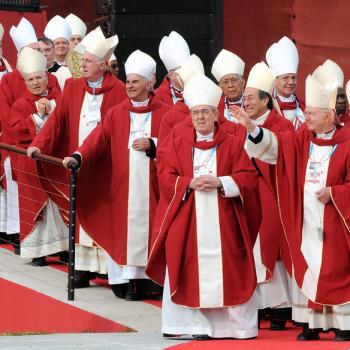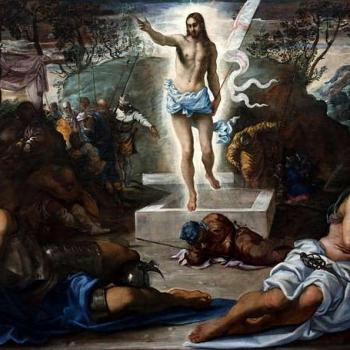Imagine a time in not-too-distant America when only religions that pass government tolerance criteria are allowed, relegating Christianity to rebellious teenagers, graffiti-spraying street gangs, and mysterious hideouts in Minnesota. (Islam, however, is grandfathered in, having established the Islamic state of Europe and threatening to invade Michigan.) Everyone is happy, though, because if you are not, you have easy access to the Happy Ending Clinics, where euthanasia is also used to deal with people who are troublesome to the state by peacefully putting them to sleep. This is the setting of Death’s Doors, the new novel by Lars Walker, who often frequents this blog.
In the story, a writer is researching a book on a religious group that is trying to restore the old Norse paganism. The group, consisting of New Age vegans, Nordic Fascists, and Viking re-enactors, somehow manage to bring back an actual Viking from the 10th century. Though he is bewildered by city lights, automobiles, and egalitarian society, he shows them, to their distress, what actual paganism is–or was–like. Then we have wormholes, time travel, ancient lore, and a single father’s desperate efforts to reach his teenaged daughter. And then things really get weird.
Death’s Door is my new favorite of Lars Walker novels. He has written a series of historical novels, with a healthy dose of fantasy, on the conversion of Scandinavia to Christianity. But, as commenter Extollager points out on the novel’s Amazon page, he is also writing about the deconversion of the West in his futuristic fantasies. (Death’s Door is in the same world with some of the same characters as another of my favorites, Wolf Time.)
I love the way Lars extrapolates the trends and attitudes of contemporary culture and turns them into an unnerving dystopia. He can be satirically hilarious when he describes this possible future, but he is also thinking deeply about them and thus about contemporary issues. Here we see a culture of death vs. a culture of life. And the Christianity in Lars’ books–this one in particular–is explicit, deeply explored, and orthodox and evangelical (Lars is a Free Lutheran). But although there are a lot of big ideas in this book and a lot of rich theologizing, Death’s Doors is just fun to read. It’s suspenseful, exciting, and wildly imaginative, both in the author’s story telling and in the way it stimulates the reader’s imagination. And I’m realizing that all good novels–including Christian novels, classics, and other works that are Good for You–need to have those qualities. And this one does.












